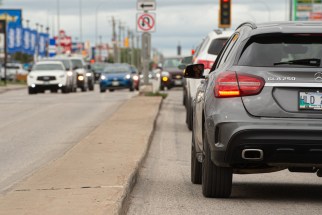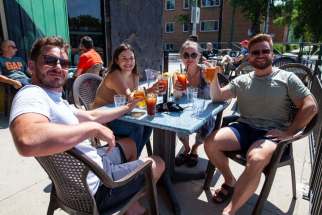Residential school pain grows, but no relief in sight Still reeling from Catholic Church documents revealing dozens of once-suspected but unconfirmed deaths, Cross Lake among First Nations awaiting federal funds to find children's graves
Read this article for free:
or
Already have an account? Log in here »
To continue reading, please subscribe:
Monthly Digital Subscription
$0 for the first 4 weeks*
- Enjoy unlimited reading on winnipegfreepress.com
- Read the E-Edition, our digital replica newspaper
- Access News Break, our award-winning app
- Play interactive puzzles
*No charge for 4 weeks then price increases to the regular rate of $19.00 plus GST every four weeks. Offer available to new and qualified returning subscribers only. Cancel any time.
Monthly Digital Subscription
$4.75/week*
- Enjoy unlimited reading on winnipegfreepress.com
- Read the E-Edition, our digital replica newspaper
- Access News Break, our award-winning app
- Play interactive puzzles
*Billed as $19 plus GST every four weeks. Cancel any time.
To continue reading, please subscribe:
Add Free Press access to your Brandon Sun subscription for only an additional
$1 for the first 4 weeks*
*Your next subscription payment will increase by $1.00 and you will be charged $16.99 plus GST for four weeks. After four weeks, your payment will increase to $23.99 plus GST every four weeks.
Read unlimited articles for free today:
or
Already have an account? Log in here »
Hey there, time traveller!
This article was published 12/10/2021 (1518 days ago), so information in it may no longer be current.
Cross Lake First Nation has learned that dozens more of its children died at the local residential school beyond the previously known 30 deaths.
That’s among recent findings by First Nations across Manitoba, who are struggling to understand what happened to their children, five months into a national reckoning over unmarked graves.
For years, the northern Cross Lake band was aware, through the work of the Truth and Reconciliation Commission of Canada, that 30 children died at the school.
But more information came to light in an Aug. 4 meeting with Archbishop Murray Chatlain, whose Catholic Church diocese of Keewatin-Le Pas covers most of northern Manitoba and Saskatchewan.
He provided Cross Lake band councillor Shirley Robinson with documentation showing another 54 deaths at the school, which operated from 1912 to 1969.
“I prayed with them, and we sat there and started talking. They were hurting too, just as I was hurting,” said Robinson, who lives near the site of the former school, where residents have long suspected the existence of more unmarked graves.
Help available
The Indian Residential Schools Crisis Line is available to anyone, including intergenerational survivors: 1-866-925-4419.
The new records show how children died, some of whom are unnamed and simply described as “little boy.” Others are listed by their full names.
One shares Robinson’s last name.
“It’s heart-wrenching. I read them over and over again, and I’m like, ‘Why did this happen,” she said, recalling having to pull off the road during the four-hour drive home from The Pas, feeling a need to look at the names again.
“I sat there, and the more I read, the more heavy my body started to feel. My eyes were watering and I kept thinking, ‘Oh my god, these children were supposed to be taken care of.’”
Her community, known locally as Pimicikamak, is among dozens that have applied for federal funding to do searches, but hasn’t received a response.
Another, just outside Portage la Prairie, has spent tens of thousands of dollars doing its own searches on sites awaiting construction.
“We’re doing piecemeal for the time being,” said Long Plain Chief Dennis Meeches, whose band applied for funding in June.
He expects it will take years to fully investigate burial sites, and wishes federal funds could get that long process started soon.
“There’s a heightened sense right across the country that we have a very important, sacred job to do — the whole country,” Meeches said.
“I would have thought, in this scenario that we’re dealing with, that the government would have facilitated a quicker response to supporting Indigenous governments and communities to help with the searches.”
At Sagkeeng First Nation, a private company has been conducting scans since July using both drones and ground-penetrating radar at the site of the former residential school and other locations.
Chief Derek Henderson said the company needs to complete its scanning before it sifts through the data to make preliminary findings and then do more work to verify the presence of graves

“I have to make sure it is a body first. I wouldn’t want to make an announcement and find out it’s not,” he said. “It’s a very delicate situation. Certainty is the most important thing for me.”
In June, Manitoba promised funding for searches and commemorations, and provincial departments have been assisting at least one band in finding records.
The province recently started forming an advisory council on how to conduct searches, though some chiefs, such as Henderson, aren’t enthusiastic.
“I don’t want someone from elsewhere to come and tell me how I should do things in Sagkeeng,” he said. “Our people already know what we’re doing and how we’re doing that, and they’ve given me that mandate.”
Yet other Indigenous communities, such as Cross Lake, say they want clear standards before they do radar searches, in order to protect any evidence that might be used in a criminal trial.
“We are doing our due diligence, to make sure we don’t make a mistake. We want to do this right,” said Chief David Monias.
The band has been in touch with the Netherlands-based International Commission on Missing Persons, which specializes in gathering evidence on everything from mass graves to industrial accidents.
Monias said he’s frustrated Ottawa hasn’t responded to requests for funding or accessing outside help, despite earmarking $321 million for searches in August.
The Crown-Indigenous Relations department did not respond by deadline to a Free Press request for comment.
Other communities are dealing with a jurisdictional maze.
The Birtle Indian Residential School boarded children from multiple reserves but doesn’t sit on a First Nation, raising questions about who should lead the process.
Birdtail Sioux is the closest reserve, and band councillor Heath Bunn said many residents suspect there are unmarked graves at the former school site.
“Once you know the whole situation, that’s the only time the true healing can start, whereas there’s still questions on the table, then there’s no real closure,” Bunn said.
Meanwhile, the former Brandon Indian Residential School is hoping the province’s pledge to collaborate will mean more access to government records. Sioux Valley Dakota Nation has been working with researchers for a decade, and believes there could be 104 Indigenous children buried at three sites near the former school site.
The community knows of children sent from residential schools to sanatoriums, but what happened to them is documented in provincial records that are covered by privacy laws.
Some of the records might be accessible if researchers get permission from relatives of a deceased child — but it’s often impossible to get the name without those very records.
“It becomes a muddied situation, like a snake eating its own tail,” said Elton Taylor, a councillor at Sioux Valley Dakota Nation.
The former Brandon school has three burial grounds on properties owned by the city, the band and a private campground. The latter had been marked as an “Indian burial ground” in maps decades ago, but was labelled a “memorial garden” when the current owner bought the property, where only preliminary forensic work has been done.
First Nations across Manitoba expressed deep appreciation for the public’s support during Canada’s National Day for Truth and Reconciliation on Sept. 30. Many want the public to push their governments roll out supports more quickly.
That includes Robinson, the Cross Lake councillor who is a survivor of a different residential school in Dauphin.
She said it’s distressing to know that relatives could be buried right outside her house, but the community can’t start the work to find them, give them a proper burial or even determine their names.
“The trauma is reopened from everything that’s happened and the pain is still there,” said Robinson, who keeps the new list of children in a safe place in her home.
“You have to work with what you have, to make sure we do the proper thing for these people listed here.”
dylan.robertson@freepress.mb.ca








